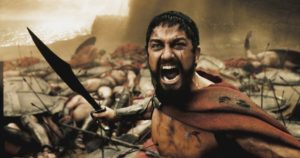
Professor of history Paul Rahe’s new book proves that the Spartans deserve more credit for shaping history than the action film “300” gives them.
“The Spartan Regime: Its History, Character, and Origins,” which will be officially released Sept. 27 by Yale University Press, is Rahe’s second book in a projected four-volume series that provides an in-depth look into the rise and fall of Sparta.
“What you usually get are single-volume books that survey things once over lightly,” Rahe said. “‘The Spartan Regime’ is a work of political science, describing the Spartan Constitution and way of life, and how their way of life grew out of their Constitution. This is Sparta in motion, as opposed to Sparta at rest.”
“It’s a sympathetic reading of Sparta,” said Victor Davis Hanson, senior fellow in Classics and Military History at Stanford’s Hoover Institute. “He’s trying to show you what they did with limited means, small population, and not very much money, and how they were so influential in a way that doesn’t make sense compared to Athens, which had a large population and territory.”
Hanson said the Spartan political system is difficult to study because most historians focus on Athens and work from a classicist’s perspective, which emphasizes language over political science.
“The Spartan Regime” aims to dispel limited views of the Spartans as mere military men only interested in power. Rahe said he sees an underlying “grand strategy” in the growth of Sparta from a fierce political regime of “military monks,” as Thomas Jefferson called them, to an imperial power that collapsed under its own weight.
Rahe’s work on the Spartan regime contains two main lessons for politics today.
“You can’t defend liberty if you go soft,” Rahe said. “The Spartans have something to teach us in the defense of liberty. And it’s also helpful in thinking about international affairs.”
Rahe’s work has peaked the interest of those interested in international affairs; he spoke with foreign policy experts in Washington, D.C., about the series’ first volume, “The Grand Strategy of Classical Sparta: The Persian Challenge” and will travel to West Point Military Academy to discuss his work later this month.
“People in the military and State Department will look at this and say, ‘Wow, this is a paradigm that we can use to deal with ISIS or Russia,’” Hanson said.
Sophomore Ellen Friesen said Rahe’s in-depth approach to history makes his classes at Hillsdale rewarding.
“He taught me a way to look at history,” Friesen said. “He looks at the underlying causes of why things happen.”
Hanson, who was an advisor in the creation of the movie “300,” said Rahe’s book presents a more hard-hitting version of what the action film presented incaricature.
“’300’ was sort of like a Greek vase painting,” Hanson said. “It had a style that’s artificial or contrived. If you look at a Greek vase painting, every Greek warrior is muscular … That’s kind of what the movie is. It’s an idealized, artificial portrait.”
“The Spartan Regime: Its History, Character, and Origins” is available online and in the Hillsdale College Bookstore.
